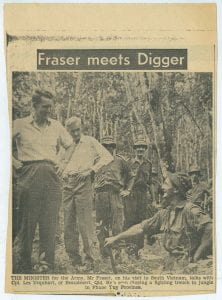“Fraser meets digger”
Pauline Georgelin

This photo “Fraser meets digger” differs from most of the scrapbook clippings in that it has no date, nor is it pasted into the scrapbook. Dating from a later period, it is simply “popped in” as though Una was going through a busy time. Perhaps she thought she would return to it later.
With modern-day hindsight, we know Malcolm Fraser as the controversial Prime Minister of “The Dismissal”, often portrayed as the devious mind behind the sacking of Gough Whitlam in 1975. But he was also the Prime Minister who oversaw the large-scale refugee resettlement which heralded the final dismantling of the White Australia Policy, as 200,000 Asian migrants arrived in Australia from 1975 – 1982, including 56,000 Vietnamese in the post-Vietnam war period.
Although the provenance of the newspaper clipping is uncertain, we can ascertain that the photo must have been taken when Fraser visited the troops in Vietnam in July 1967, while Minister for the Army in the government of Harold Holt. The Canberra Times of Friday 28th July reported his one-week trip, noting that he handed gifts from the Australian people to the South Vietnamese junior academy in Vung Tau. This informal photo shows the diggers resting on their shovels, pausing to speak to Fraser who stands relaxed with his sleeves rolled up. All are smiling. Fraser’s memoirs tell another side of the story. ‘The heat was overwhelming. There was mud everywhere.1
The photo belongs to a well-known tradition in political photography: a statement of military leadership made by politicians and prime ministers by posing for photos with their troops in the field – from Billy Hughes posing with diggers on the Western Front in the first World War, to Malcolm Turnbull with Defence Force personnel more recently in Afghanistan.
As a reference point and marker in the evolution of Malcolm Fraser, and an evocative symbol of Australia’s involvement in the Vietnam War, the photo can be seen as emblematic of a mid-point of Fraser’s political career and of his engagement with and awareness of Asia.
Other parts of the University of Melbourne’s Malcolm Fraser Collection include transcripts of his weekly radio broadcasts to his electorate of Wannon. A very early broadcast, of May 10th, 1959 was titled: “Australians and Asia”. In it, Fraser regrets that “As a general rule, Australians know far too little about their neighbours in South East Asia.” He argues that a better knowledge of Asian languages and culture is vital for Australia to be of benefit in the region, assert its influence and combat the spread of communism.2
According to Fraser’s memoirs, in time he came to regret Australia’s involvement in the Vietnam War, although he was initially idealistic. The later realisation of CIA interference and dishonesty on the part of the US government also give an ironic context to the photo. ‘The journey to Fraser’s present position on Vietnam – bitter reflection on the gaps between what he was told, what he believed, what he hoped for and what actually happened – has been a slow one.’3
With its sentimental appeal to the images of Australia soldiers in the first World War, the Aussie digger, this photo represents a poignant and powerful symbol of this period in which Fraser and the Australian government stood for a mistaken engagement with war in Asia rather than hospitality towards Asians within the nation. It sits nicely in the middle of Fraser’s time line, and represents the transitions and evolution of his political career as well as a personal “journey” to comprehend Australia’s relationship with Asia.
CONCLUSION
These four reports on documents from the extensive and fascinating Una Fraser collection give an indication of the rich variety of material it contains. As doctoral candidates, our choices covering these early and later years of Fraser’s career show some of the many different themes in Australian political and social history which might be explored through the collection.
Pauline Georgelin is a PhD candidate in the School of Languages and Linguistics. Her thesis is about the nature and activities of the French and French-speaking communities in Australia during the First World War. It examines the networks and connections which led to a variety of responses and contributions to the war effort.
1 Malcolm Fraser and Margaret Simons, Malcolm Fraser: The Political Memoirs (Melbourne: Melbourne University Press, 2010), 154
2 ‘Australians and Asia’ 10 May 1965, Malcolm Fraser Radio Talks Transcripts, University of Melbourne Archives 2007.0023.0419, http://hdl.handle.net/11343/40382
3 Fraser and Simons, Malcolm Fraser: The Political Memoirs, 136
‘Fraser meets digger’ undated press clipping, University of Melbourne Archives, Una Fraser Collection, 2008.0058 unit 2
Leave a Reply